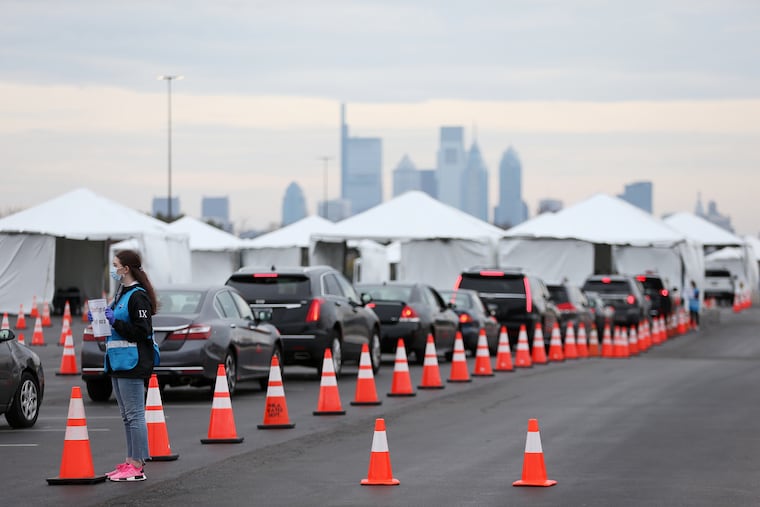At coronavirus test site outside Citizens Bank Park, Philadelphians seek reassurance
"So if I’m in this line wrongly I’m going to find out very soon," one person seeking a test for the new coronavirus said.

Ana Avila was inside one of about a dozen cars waiting to enter the new coronavirus testing site outside of Citizens Bank Park. She had been nervous since learning one of her patients had been in contact with the Children’s Hospital of Philadelphia cardiologist who tested positive for coronavirus.
The 24-year-old mental health worker from North Philadelphia thinks her patient could be positive, too. After treating the patient, Avila got sick the next day. She had a dry cough, a fever around 104, and shortness of breath — symptoms of the coronavirus.
Avila went to the Hospital of the University of Pennsylvania last Thursday and she says she was told she had pneumonia and was sent home. She was not tested for the coronavirus.
Now, more than a week later, her symptoms continue. She hoped the new site, which opened Friday outside the Phillies’ home, would be able to test her.
It’s one of 20 sites in the Philadelphia region, Health Commissioner Thomas Farley said, and the first government-sponsored site in the city. The Citizens Bank Park site started with 2,500 testing kits, Farley said, making it the largest in the city in terms of capacity and its footprint in the large parking lot.
Avila wore a mask while she waited in her car.
There were other people in line who said they didn’t have symptoms but were hoping to get tested just to be sure. One man said he was nervous because he has chronic obstructive pulmonary disease. A 61-year-old Lyft driver, Kenneth Thompson, said he wanted to be tested because he believed he was in the high risk category because of his age.
He doesn’t really have symptoms, like a cough or fever, but he just feels like he is getting sick.
“As much as we can clean our cars, as much as we can wash our hands, as much as we can protect our faces it’s still unknown, the proximity it needs to get to another person, and I am one of those people who will always try to do the right thing,” Thompson said. "So if I’m in this line wrongly I’m going to find out very soon.”
Joe Marsh, 40, an Amtrak train dispatcher from Deptford, was also wearing a mask in his car. His doctor’s office gave it to him, along with a script to be tested for the new coronavirus.
“This is the worst I’ve ever felt, honestly,” Marsh said. “It feels like an elephant is sitting on your chest.”
He has spent four days with symptoms like shortness of breath and coughing. His fever is 100.4. He said his tongue is gray, he is losing his sense of taste, and struggles to keep food down. He has no idea how he got sick.
“This is not the common flu,” Marsh said.
Jean Peters, 65, has a temperature around 100 and shortness of breath. A few weeks ago, her husband was sick with aches and coughing, but recovered. They don’t know if he was infected with the new coronavirus, but Jean Peters is now worried she might be. Their family physician recommended she get tested at a Penn site, but she couldn’t be tested there until Monday. So they thought they’d try here first.
“It’s just stressful not knowing,” Jean Peters said. “So it would be nice to know one way or another if we really need to watch ourselves to eliminate the unknown.” They’ve been pretty much isolating themselves anyway and she hopes she is cleared so she can visit her 30-year-old twin daughters again.
Avila, like all the other people waiting to get tested, some with tissue boxes on their dashboards, pulled her car into the parking lot, following the orange cones toward Emma Ewing, a 19-year-old Temple University sophomore who was volunteering. She wore a mask and held a sign with gloves that read: “Don’t get out of your car.”
» READ MORE: This is what it’s like being tested for the coronavirus
Soon, Avila would approach the first tent, with more volunteers outside holding up instructions:.
“Put your car in park and turn it off at each station”
“Only lower your window to eye level.”
This would be the pre-screening station where medical volunteers will determine if she is eligible for testing. Because Avila described her symptoms and confirmed she is a healthcare worker, she would be permitted to continue. The drive-through testing is only available for health care workers and people older than 50 who are showing symptoms of the virus, officials said.
Then she would pass through a second station, answering questions like her name, date of birth, address, phone number, health insurance, job, and any chronic health conditions.
At the testing tent, clinicians in personal protective equipment, like surgical gowns, gloves, face masks, and a face shield, would then swab her for the coronavirus test. The entire process should take about 15 minutes.
Now she is waiting again. Farley said results could take two to five days. Avila hopes this sickness is not the coronavirus. She’s been calling off work since last Wednesday and has been financially supporting herself with her savings.
“It does scare me,” Avila said. “I just feel like it’s really easy to spread. It’s spreading everywhere even without symptoms you could possibly still have it. I just advise people to stay away from people, like it’s not worth it.”
Staff writer Laura McCrystal contributed to this report.